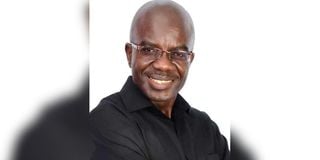Jaindi Kisero: Washington Akumu had the mindset of a poet and a painter

Veteran editor and business journalist Washington Akumu.
No death has caused me to pause and re-evaluate my life as a business journalist and to ponder about my times in the newspaper newsroom than the death on Monday this week of Washington Akumu.
I have deeply nostalgic memories about the warm and fuzzy workplace environment where I worked and engaged with Washington as his mentor and supervisor for more than 10 years.
He was a supremely talented newspaper journalist and newsroom leader. He approached the art of story – telling with the mindset of a poet and painter.
Many, especially, the uninitiated corporate snobs – tend to treat journalism as if it was intuitive work that any bright person can quickly master.
Washington was a Bachelor of Commerce (Marketing Option) graduate from the University of Nairobi. But he was a marketer with a deep journalistic conscience.
You have to understand the context, history and state of newspaper business journalism at the time Washington and his generation were joining the trade to appreciate why they rose quickly to become big-name business journalists within a short period.
The late Samuel Nduati, the head of the business desk, occupied the position of Business Editor. But the tradition of the newsroom during this period was that the Business Editor’s most important remit was to be a copy editor stationed at the desk and only minimally getting involved in the newsgathering and storytelling side of the trade.
Cocky and endowed with a great sense of humour, it was Washington who coined the phrase ‘stationary bandits’ to describe desk-based journalists confined to the workplace, he did not have the time to build news sources and networks, and therefore could not go beyond performing the mundane and technical responsibility of processing content generated by others – reporters and story-tellers.
Yesterday, I picked up a bound volume of the weekly insert, BusinessWeek, to refresh my memories on the type of journalism Washington excelled in. Powerful story-telling and exceptional skills in magazine-style opinionated analysis is what I saw. He was a hard news man who placed the highest value on getting the right story and above all, getting it right. I had joined the Daily Nation as Associate Editor in charge of BusinessWeek in July, 1999.
Washington was the star writer on what was at that time a newsheavy weekly pull-out where reporters were always encouraged to dig up scoops write harder and be more questioning. Washington was the best team player I have ever worked with in my professional life. At BusinessWeek, Washington and the team strive to deliver and practice NMG’s corporate motto – ‘We Are A Team’. Stocked with some of the finest editorial minds, the other members of this team were Okoth Obado (JJ), Musyoka wa Kyendo, Muna Wahome (Andy Cap) and John Bundotich.
Such was the influence of BusinessWeek that Joe Odindo, the Managing Editor, of the main paper, would break his weekend rest days every Sunday to find out what BusinessWeek was carrying on its front page. In many occasions, he would take our stories and splash them on the front page of the main paper. Excuse me if I digress. I just wanted to discuss the workplace environment where Washington worked and stress the point that he was part of a team that approached business journalism with the mindset of missionaries – a group of journalists united in a mission underpinned by earnest faith that work and camaraderie at the workplace mattered.
The more I reflect on the life and times of Washington and my interactions with him, the more I am convinced that journalism needs bosses who understand the value of the collaborative spirit in the newsroom.
People who are always under pressure don’t need bosses who are always carrying whips in their hands. I cannot comment with authority on Washington’s professional life in the PR and communications world. But I still remember how he once upon a time walked to my office to inform me that he was taking up a PR job at Safaricom.
As a mentor, I encouraged him to move on. But I made a mental note that his movement was going to be putting a square peg in a round hole. Yet, the new job he was taking would thrust him into a culture in Kenya’s corporate world where your best ticket to success is sycophancy and where you must be a person who is quick to blow your trumpet and to claim credit to scale the ladder. He did not last at Safaricom.
Washington succeeded as MD of Media Edge. In my view, that was because he was able to fit in because his senior partners, Koome Mwambia and Okoth Obado, are PR professionals with a journalistic conscience. Okoth started from BusinessWeek.
The last time I met Washington was when he came along with a colleague to my office to introduce me to the lady. We cracked jokes about his transformation from a poacher to a warden. I asked him: How often do you read newspapers these days? He answered, ‘I love the smell of newspapers’.





